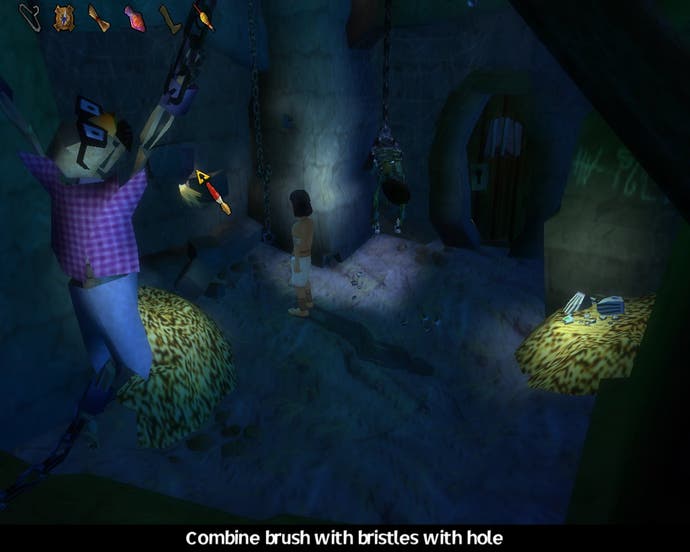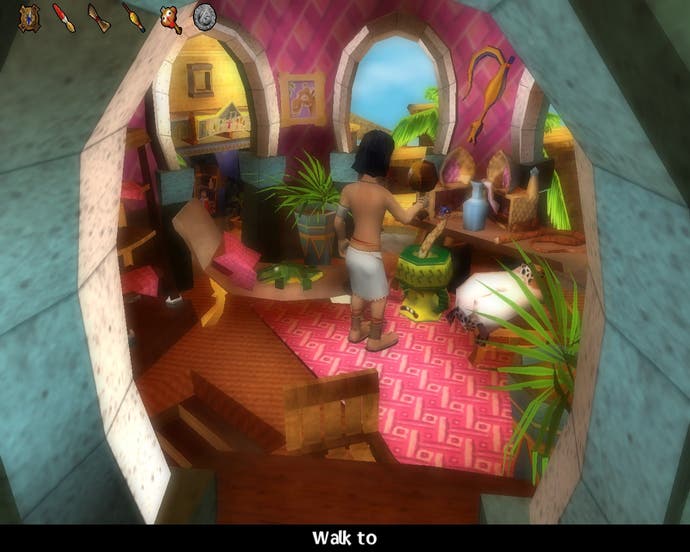Ankh
It walks like an Egyptian. But can it talk English?
Blimey, sand. We've not seen that since Blackpool, or at least Call of Duty 2. It's nice to get away from those grinding mills of Normandy and all those first-person shooters, knot a hanky on your head, suck a whelk and relax with a nice old-fashioned adventure game. This one's even set in a vaguely original locale, Egypt under the Pharaohs, replete with humorous mummies, camels with the hump and toothless crocodiles.
You play Asil, the son of the Pharaoh's architect who, out drinking with his buddies in a new pyramid, is death-cursed by a mummy for breaking his grave goods and generally despoiling his tomb-with-a-view. The only person who can remove curses is the party-animal Pharaoh but he's inaccessible to a penniless pleb like you. And your dad's grounded you, to boot. How will you survive another day? By the random collection and jocular utilisation of arbitrarily available objects, that's how!
Our only problem with the setting of adventure-game Egypt is that the eminently superior Discworld 2: Mortality Bytes has already been there. Eric Idle supplied the voice of Rincewind in the parodic pyramidic settings of Djelibeybi ten years ago. What with excellent puns, pythonesque parodies and in-jokes older than King Tut, this ancient game is now free (it's abandonware, available online), so Ankh has a real challenge on its bandaged hands.

Moreover, though we're mildly impressed that the translators have managed to grasp the basics of English rather than running the game through babelfish, we must bemoan the reluctance of companies to put a little, just a little, of their localisation budget, into a subeditor or even an actual writer. Though the conversation here isn't as criminally translated as some are (John Walker reviews passim), there's a lack of fluency in the language that crucifies all but the most surreal or slapstick jokes. We're sure that the translator removed loads of gags that were hilarious in German and, to be fair, their replacements are passable, but even the actors must have noticed that often the words just don't scan. Adventure games are the closest genre to books and rely entirely on dialogue and puzzles to maintain your interest, so it's puzzling that they've skimped this area at all.
And of course, buried beneath the shifting sands like lost gems or dog turds, lie the other half of the equation, puzzles. Like most modern adventure games, they vary between the damn obvious and the outrageously tough with very little in between. A crocodile sits at the bottom of a river, blocking the only way back to land. Subtly, the developers have bestrewn his lair with lots of armless corpses, piled hundreds of chewed arms next to him, and given you a stone arm. How will you ever dispose of him? Then there's the usual blockages, where the puzzle is so counter-intuitive that you have to try every randomly accrued item on every other, until an arbitrary occurrence kicks in and you can move on to the next stage. Of course, you should use the wine and coat hanger on the hole in the wall, that'll surely unlock the prison door. We'd be kicking ourselves if we hadn't chewed our legs off in frustration.

Furthermore, the twin pains of unflagged map areas (how exactly is one supposed to know the screen scrolls there but not there?) necessitating endless trudging and arbitrary object restrictions (no you can't pick up that jar, you must pick up that one) crop up as always. Finally, if you actually play this game through without being stuck, you're not going to be sat in front of your screen for more than a few hours, which is a querulous reward for a £30 outlay.
Whilst we loved Grim Fandango, there were bits of it that were unplayable without a walkthrough or a mind so lateral that bits of it were poking through the other side; its saving grace was its style, fluency, and humour. The Myst series and the much-maligned Aura: Fate of Ages suffered the other way; they had puzzles that you could work out, albeit with neuron-popping levels of application, but were clunky and lacked both humour and interest. Ankh is definitely in the former category of style over substance, but the hardest puzzle of all is why more companies don't take the best of both worlds, putting genuine mental challenges in their games rather than this capricious object interaction. The gloriously twee Samorost shows just how both can be achieved and the DS's Another Code (Trace Memory to our US brethren) demonstrates that original, logical puzzle-making is possible.
That said, Ankh is hard to dislike. It's certainly good to look at, the visual gags work well enough, and most of the brainteasers are intuitive. Yet, in a genre that advances as quickly as the pyramids, the few knobs and whistles that modern technology brings really don't drag Ankh up to the level of its glorious forebears, and the linguistic difficulties and its brevity knock it down.
